#bookselling
Text
How a billionaire’s mediocre pump-and-dump “book” became a “bestseller”
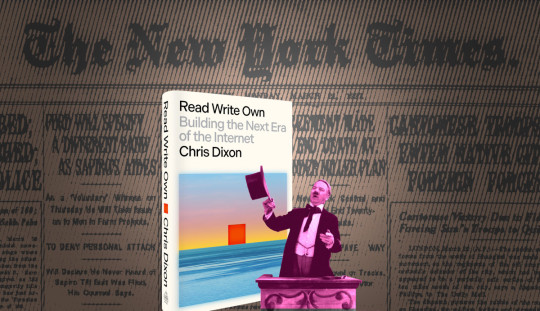
If you'd like an essay-formatted version of this post to read or share, here's a link to it on pluralistic.net, my surveillance-free, ad-free, tracker-free blog:
https://pluralistic.net/2024/02/15/your-new-first-name/#that-dagger-tho

I was on a book tour the day my editor called me and told me, "From now on, your middle name is 'Cory.'"
"That's weird. Why?"
"Because from now on, your first name is 'New York Times Bestselling Author.'"
That was how I found out I'd hit the NYT list for the first time. It was a huge moment – just as it has been each subsequent time it's happened. First, because of how it warmed my little ego, but second, and more importantly, because of how it affected my book and all the books afterwards.
Once your book is a Times bestseller, every bookseller in America orders enough copies to fill a front-facing display on a new release shelf or a stack on a bestseller table. They order more copies of your backlist. Foreign rights buyers at Frankfurt crowd around your international agents to bid on your book. Movie studios come calling. It's a huge deal.
My books became Times bestsellers the old-fashioned way: people bought and read them and told their friends, who bought and read them. Booksellers who enjoyed them wrote "shelf-talkers" – short reviews – and displayed them alongside the book.
That "From now on your first name is 'New York Times Bestselling Author' gag is a tradition. When @wilwheaton's memoir Still Just A Geek hit the Times list, I texted the joke to him and he texted back to say @jscalzi had already sent him the same joke (and of course, Scalzi and I have the same editor, Patrick Nielsen Hayden):
https://www.harpercollins.com/products/still-just-a-geek-wil-wheaton
But not everyone earns that first name the same way. Some people cheat.
Famously, the Church of Scientology was caught buying truckloads of L Ron Hubbard books (published by Scientology's own publishing arm) from booksellers, returning them to their warehouse, then shipping them back to the booksellers when they re-ordered the sold out titles. The tip-off came when booksellers opened cases of books and found that they already bore the store's own price-stickers:
https://www.latimes.com/local/la-scientology062890-story.html
The reason Scientology was willing to go to such great lengths wasn't merely that readers used "NYT Bestseller* to choose which books to buy. Far more important was the signal that this sent to the entire book trade, from reviewers to librarians to booksellers, who made important decisions about how many copies of the books to stock, whether to display them spine- or face out, and whether to return unsold stock or leave it on the shelf.
Publishers go to great lengths to send these messages to the trade: sending out fancy advance review copies in elaborate packaging, taking out ads in the trade magazines, featuring titles in their catalogs and sending their sales-force out to impress the publisher's enthusiasm on their accounts.
Even the advance can be a way to signal the trade: when a publisher announces that it just acquired a book for an eyebrow-raising sum, it's not trumpeting the size of its capital reserves – it's telling the trade that this book is a Big Deal that they should pay attention to.
(Of all the signals, this one may be the weakest, even if it's the most expensive for publishers to send. Take the $1.25m advance that Rupert Murdoch's Harpercollins paid to Sarah Palin for her unreadable memoir, Going Rogue. As with so many of the outsized sums Murdoch's press and papers pay to right wing politicians, the figure didn't represent a bet on the commercial prospects of the book – which tanked – but rather, a legal way to launder massive cash transfers from the far-right billionaire to a generation of politicians who now owe him some rather expensive favors.)
All of which brings me to the New York Times bestselling book Read Write Own by the billionaire VC New York Times Bestselling Author Chris Dixon. Dixon is a partner at A16Z, the venture capitalists who pumped billions into failed, scammy, cryptocurrency companies that tricked normies into converting their perfectly cromulent "fiat" money into shitcoins, allowing the investors to turn a massive profit and exit before the companies collapsed or imploded.
Read Write Own (subtitle: "Building the Next Era of the Internet") is a monumentally unconvincing hymn to the blockchain. As Molly White writes in her scathing review, the book is full of undisclosed conflicts of interest, with Dixon touting companies he has a direct personal stake in:
https://www.citationneeded.news/review-read-write-own-by-chris-dixon/
But this book's defects go beyond this kind of sleazy pump-and-dump behavior. It's also just bad. The arguments it makes for the blockchain as a way of escaping the problems of an enshittified, monopolized internet are bad arguments. White dissects each of these arguments very skillfully, and I urge you to read her review for a full list, but I'll reproduce one here to give you a taste:
After three chapters in which Dixon provides a (rather revisionistd) history of the web to date, explains the mechanics of blockchains, and goes over the types of things one might theoretically be able to do with a blockchain, we are left with "Part Four: Here and Now", then the final "Part Five: What's Next". The name of Part Four suggests that he will perhaps lay out a list of blockchain projects that are currently successfully solving real problems.
This may be why Part Four is precisely four and a half pages long. And rather than name any successful projects, Dixon instead spends his few pages excoriating the "casino" projects that he says have given crypto a bad rap,e prompting regulatory scrutiny that is making "ethical entrepreneurs … afraid to build products" in the United States.f
As White says, this is just not a good book. It doesn't contain anything to excite people who are already blockchain-poisoned crypto cultists – and it also lacks anything that will convince normies who never let Matt Damon or Spike Lee convince them to trade dollars for magic beans. It's one of those books that manages to be both paper and a paperweight.
And yet…it's a New York Times Bestseller. How did this come to pass? Here's a hint: remember how the Scientologists got L Ron Hubbard 20 consecutive #1 Bestsellers?
As Jordan Pearson writes for Motherboard, Read Write Own earned its place on the Times list because of a series of massive bulk orders from firms linked to A16Z and Dixon, which ordered between dozens and thousands of copies and gave them away to employees or just randos on Twitter:
https://www.vice.com/en/article/n7emkx/chris-dixon-a16z-read-write-own-nyt-bestseller
The Times recognizes this in a backhanded way, by marking Read Write Own on the list with a "dagger" (†) that indicates the shenanigans (the same dagger appeared alongside the listing for Donald Trump Jr's Triggered after the RNC spent a metric scientologyload of money – $100k – buying up cases of it):
https://www.nytimes.com/2019/11/21/books/donald-trump-jr-triggered-sales.html
There's a case for the Times not automatically ignoring bulk orders. Since 2020, I've run Kickstarters where I've pre-sold my books on behalf of my publisher, working with bookstores like Book Soup and wholesalers like Porchlight Books to backers when they go on sale. I signed and personalized 500+ books at Vroman's yesterday for backers who pre-ordered my next novel, The Bezzle:
https://www.flickr.com/photos/doctorow/53531243480/
But there's a world of difference between pre-orders that hundreds or thousands of readers place that are aggregated into a single bulk order, and books that are bought by CEOs to give away to people who may not have any interest in them. For the book trade – librarians, reviewers, booksellers – the former indicates broad interest that justifies their attention. The latter just tells you that a handful of deep-pocketed manipulators want you to think there's broad interest.
I'm certain that Dixon – like me – feels a bit of pride at having "earned" a new first name. But Dixon – like me – gets something far more tangible than a bit of egoboo out of making the Times list. For me, a place on the Times list is a way to get booksellers and librarians excited about sharing my book with readers.
For Dixon, the stakes are much higher. Remember that cryptocurrency is a faith-based initiative whose mechanism is: "convince normies that shitcoins will be worth more tomorrow than they are today, and then trade them the shitcoins that cost you nothing to create for dollars that they worked hard to earn."
In other words, crypto is a bezzle, defined by John Kenneth Galbraith as "The magic interval when a confidence trickster knows he has the money he has appropriated but the victim does not yet understand that he has lost it."
So long as shitcoins haven't fallen to zero, the bag-holders who've traded their "fiat" for funny money can live in the bezzle, convinced that their "investments" will recover and turn a profit. More importantly, keeping the bezzle alive preserves the possibility of luring in more normies who can infuse the system with fresh dollars to use as convincers that keep the bag-holders to keep holding that bag, rather than bailing and precipitating the zeroing out of the whole scam.
The relatively small sums that Dixon and his affiliated plutocrats spent to flood your podcasts with ads for this pointless 300-page Ponzi ad are a bargain, as are the sums they spent buying up cases of the book to give away or just stash in a storeroom. If only a few hundred retirees are convinced to convert their savings to crypto, the resulting flush of cash will make the line go up, allowing whales like Dixon and A16Z to cash out, or make more leveraged bets, or both. Crypto is a system with very few good trades, but spending chump change to earn a spot on the Times list (dagger or no) is a no-brainer.
After all, the kinds of people who buy crypto are, famously, the kinds of people who think books are stupid ("I would never read a book" -S Bankman-Fried):
https://www.washingtonpost.com/opinions/2022/11/29/sam-bankman-fried-reading-effective-altruism/
There's precious little likelihood that anyone will be convinced to go long on crypto thanks to the words in this book. But the Times list has enough prestige to lure more suckers into the casino: "I'm not going to read this thing, but if it's on the list, that means other people must have read it and think it's convincing."
We are living through a golden age of scams, and crypto, which has elevated caveat emptor to a moral virtue ("not your wallet, not your coins"), is a scammer's paradise. Stein's Law tells us that "anything that can't go on forever will eventually stop," but the purpose of a bezzle isn't to keep the scam going forever – just until the scammer can cash out and blow town. The longer the bezzle goes on for, the richer the scammer gets.
Not for nothing, my next novel – which comes out on Feb 20 – is called The Bezzle. It stars Marty Hench, my hard-driving, two-fisted, high-tech forensic accountant, who finds himself unwinding a whole menagerie of scams, from a hamburger-based Ponzi scheme to rampant music royalty theft to a vast prison-tech scam that uses prisoners as the ultimate captive audience:
https://us.macmillan.com/books/9781250865878/thebezzle
Patrick Nielsen Hayden – the same editor who gave me my new first name – once told me that "publishing is the act of connecting a text with an audience." Everything a publisher does – editing, printing, warehousing, distributing – can be separated from publishing. The thing a publisher does that makes them a publisher – not a printer or a warehouser or an editing shop – is connecting books and audiences.
Seen in this light, publishing is a subset of the hard problem of advertising, religion, politics and every other endeavor that consists in part of convincing people to try out a new idea:
https://pluralistic.net/2021/07/04/self-publishing/
This may be the golden age of scams, but it's the dark age of publishing. Consolidation in distribution has gutted the power of the sales force to convince booksellers to stock books that the publisher believes in. Consolidation in publishing – especially Amazon, which is both a publisher and the largest retailer in the country – has stacked the deck against books looking for readers and vice-versa (Goodreads, a service founded for that purpose, is now just another tentacle on the Amazon shoggoth). The rapid enshittification of social media has clobbered the one semi-reliable channel publicists and authors had to reach readers directly.
I wrote nine books during lockdown (I write as displacement activity for anxiety) which has given me a chance to see publishing in the way that few authors can: through a sequence of rapid engagements with the system as a whole, as I publish between one and three books per year for multiple, consecutive years. From that vantagepoint, I can tell you that it's grim and getting grimmer. The slots that books that connected with readers once occupied are now increasingly occupied by the equivalent of the botshit that fills the first eight screens of your Google search results: book-shaped objects that have gamed their way to the top of the list.
https://www.theguardian.com/commentisfree/2024/jan/03/botshit-generative-ai-imminent-threat-democracy
I don't know what to do about this, but I have one piece of advice: if you read a book you love, tell other people about it. Tell them face-to-face. In your groupchat. On social media. Even on Goodreads. Every book is a lottery ticket, but the bezzlers are buying their tickets by the case: every time you tell someone about a book you loved (and even better, why you loved it), you buy a writer another ticket.
Meanwhile, I've got to go get ready for my book tour. I'm coming to LA, San Francisco, Seattle, Vancouver, Calgary, Phoenix, Portland, Providence, Boston, New York City, Toronto, San Diego, Salt Lake City, Tucson, Chicago, Buffalo, as well as Torino and Tartu (details soon!).
If you want to get a taste of The Bezzle, here's an excerpt:
https://www.torforgeblog.com/2023/11/20/excerpt-reveal-the-bezzle-by-cory-doctorow/
And here's the audiobook, read by New York Times Bestselling Author Wil Wheaton:
https://archive.org/download/Cory_Doctorow_Podcast_459/Cory_Doctorow_Podcast_459_-_The_Bezzle_Read_By_Wil_Wheaton.mp3
#pluralistic#molly white#books#publishing#dunning kruggerands#crypto#cryptocurrency#a16z#venture capitalism#guillotine watch#this is why we can't have nice things#bookselling#the bezzle#bezzles#web3#blockchain
373 notes
·
View notes
Text
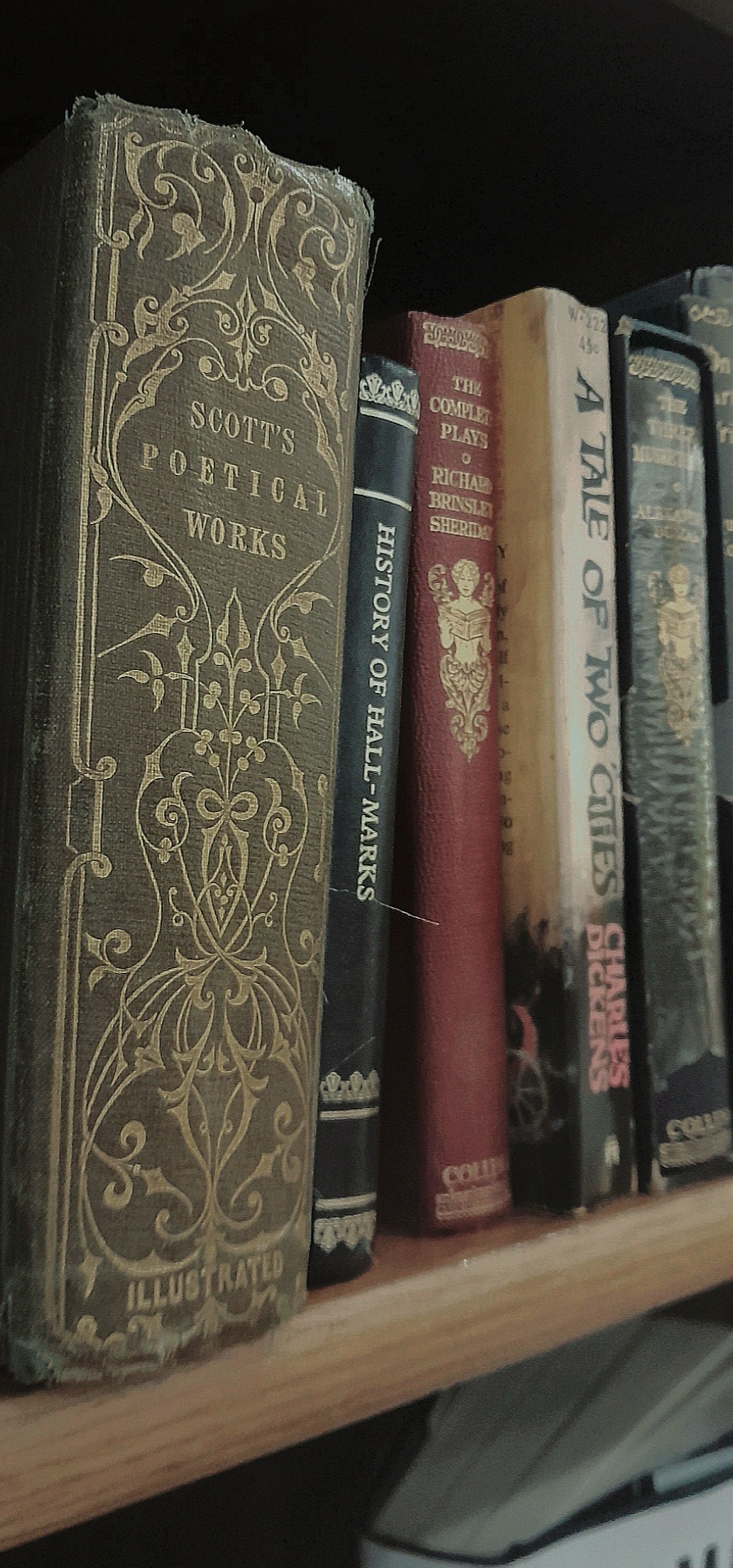

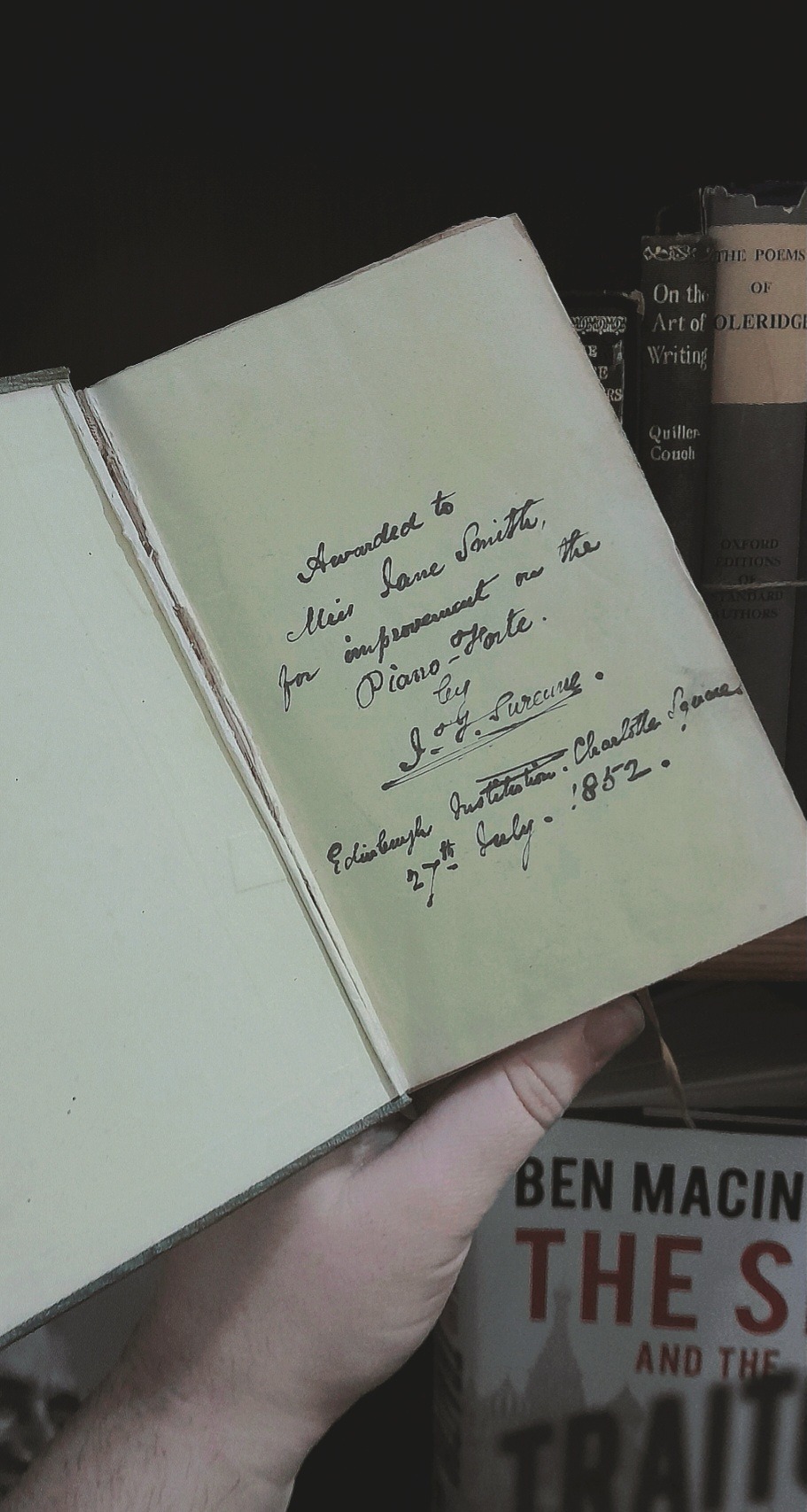
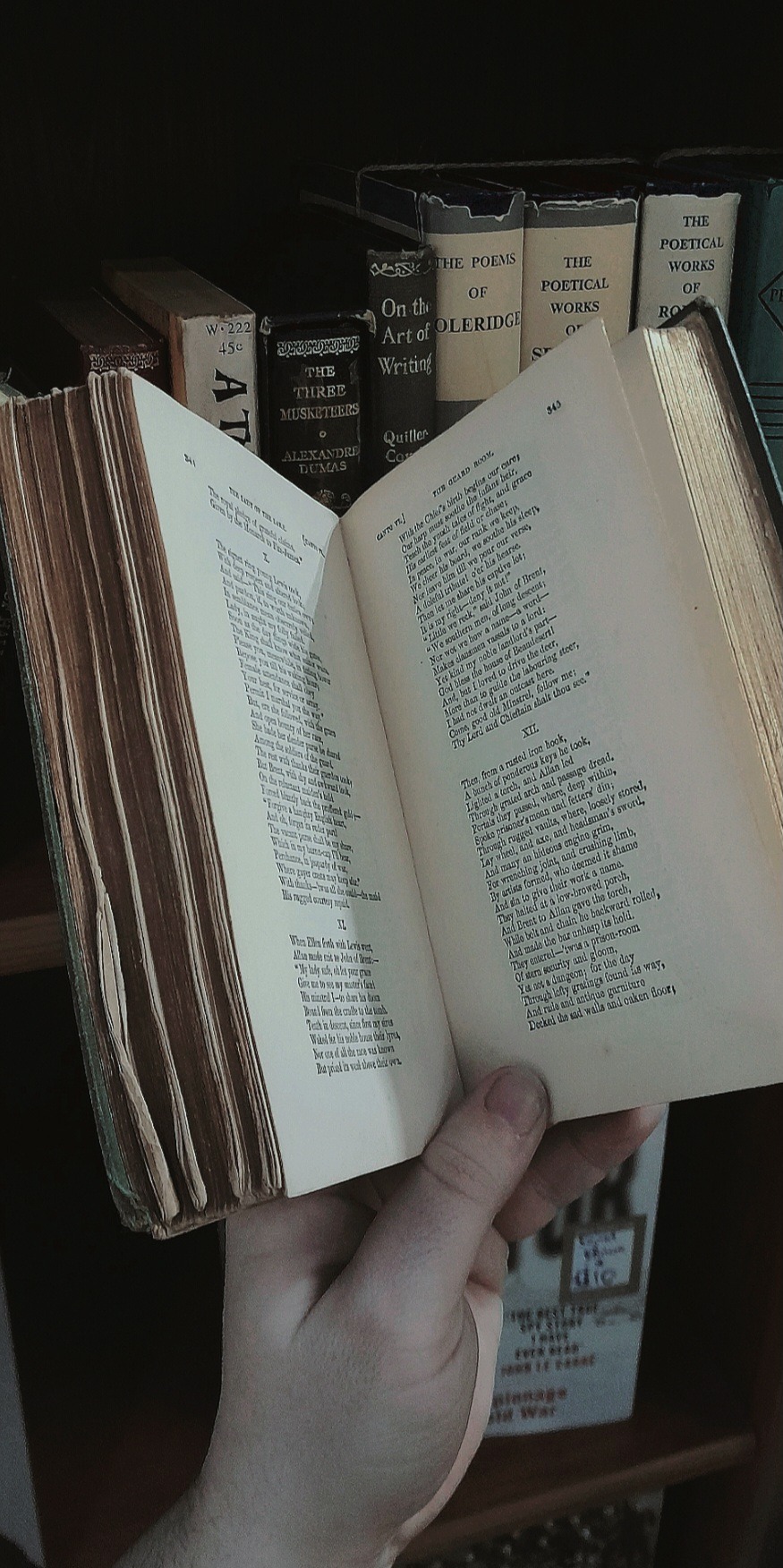
Scotts Poetical Works
With a dedication from 1852
#old books#antiquarian books#rare books#bookblr#booklr#book community#donated books#poetry books#charity shop books#pretty books#reader#bookseller#bookselling#bookshop#book girl#booklover#book stuff#books#book tumblr#dark academia#dark aesthetic#dark acadamia aesthetic
139 notes
·
View notes
Text

he wont buy the product AND he flooded the company basement? rude!
#original content#libraries#hippos#advertisement#vintage advertising#vintage#bookselling#bookstore#books
32 notes
·
View notes
Text
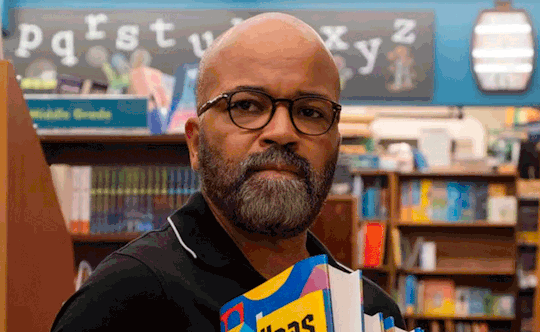
The screen I spend the most time with these days is a black LCD monitor attached to a PC in an indie bookshop on Long Island. I spend whole days looking at point-of-sale software called Anthology which also keeps track of the store’s inventory. Often, it’s accurate. Occasionally, it says we have three copies of The Bell Jar that have simply disappeared from the face of the Earth. No one stole them. They were raptured, like socks that never make it out of the dryer.
If you’ve never worked a retail job, let me tell you what it’s like: you come in with a little spring in your step, caffeinated, and ready to greet your coworkers and update them on how terrible your last shift without them was. Though the memory of the previous shift’s slog might give you a little anxiety, and though a hangover can make your fuse a little short, you’re in a better mood at the start of the day than at the end. Tedious tasks like ordering and unboxing books (sci-fi movies did not prepare me for how much cardboard there would be in the future) seem manageable in the morning. Customers seem kind. The items you’re selling feel necessary to human happiness. Whatever is going on in your life is put on pause to manage store operations, and time flies. Then, by 3 PM, whether you had time for lunch or not, you wish you had done anything else with your day — or, better yet — your life.
While the back-straining work of moving inventory around the store or walking the floor helping customers all day without a second to sit down might make you physically tired, the real work of retail is mental and forces employees to become part-machine. Retail workers have to ask the same three questions (“Rewards?” “Bag?” “Receipt?”) and reply to the same three questions (“Have it?” “Bathroom?” “Manager?!?!?”) for 8-10 of their most worthwhile waking hours.
In bookstores, there is the added expectation that while you’re participating in this mind-numbing routine, you’re at least able to pretend to like and engage with literature. I'm not arguing that people working at Old Navy aren’t eloquent or as over-educated for their job as I am. If they aren’t teenagers, most retail employees I’ve encountered have, by virtue of talking to coworkers and customers all day, the same high emotional intelligence as the smartest people I know who chain smoke outside bars. Still, my guess is that it’s rare for a customer to see a clothing store employee folding clothes, and think “I wonder what their opinion is of the latest Ann Patchett book” or “I wonder if they read Knausgård and run a book club when they’re not helping me find jeans in my size.” People see booksellers doing the same tedious tasks as any other retail employee and assume they not only possess unlimited knowledge about the state of publishing but also have unlimited hours to read while in the store. Customers hold booksellers to an impossible intellectual standard. When they fail to live up to said standard, they’re subjected to conversations like this:
“You haven’t read the latest Kingsolver?” a customer will ask, “Why not? What about this one? Or that one? It’s so good though! I thought you would have read all of these!”
What’s a shame is that they think they’re being kind when they half-recommend, half-admonish bookstore employees. Worse are the people who are flat-out rude. Case in point, a man came into the store at hour six of my shift, and without any preamble, treating me like I was a human Google search bar, said the name of an author, then started spelling the name. When I asked for a second to look up what I assumed he was asking for, he rolled his eyes and began spelling slowly and loudly: “PAUL. P…A…U…”
Sadly, I’m too old to be treated that way and without thinking I raised my hand and said sternly “Don’t do that.” Now some oblivious retired banker is walking around Long Island asking himself why indie booksellers are so mean. My Midwestern niceness has disappeared, my helpful attitude is now nonexistent. I have been worn down by the people I’m paid to be kind to.
Read the rest here.
#lit#lol#humor#funny#essay#essays#bookselling#barnes and noble#reading#writing#customers#american fiction#books#literature#better book titles#dan wilbur
42 notes
·
View notes
Text
Today I told a customer that the Redwall series was like LotR if Frodo was a mouse who did war crimes.
He bought it
23 notes
·
View notes
Text

I love bookshops, and I love Aziraphale. As a result, I have an endless residual anxiety that Aziraphale would refuse to sell me a book if I visited his shop. It...it really hurts.
#good omens#good omens season 2#aziraphale#bookshop#aziraphale's bookshop#bookselling#not selling books#but i want to buy a book#why won't you sell me a book angel?#books
21 notes
·
View notes
Text
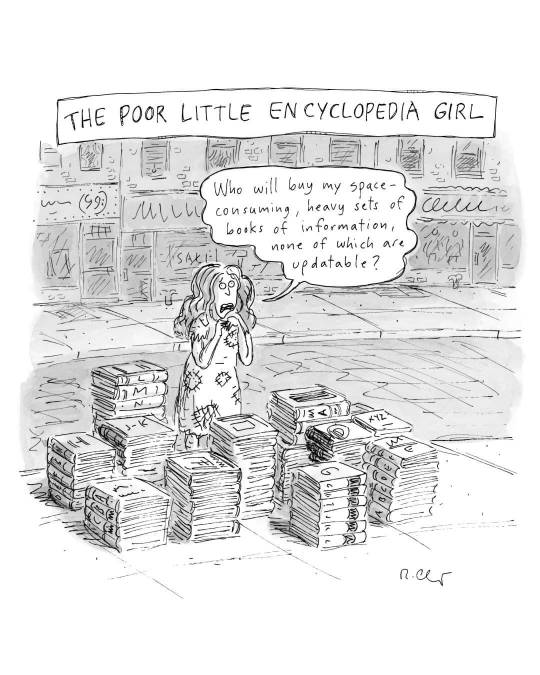
5 notes
·
View notes
Text
In a 14-page written opinion, presiding district court judge Gregory Woods called magistrate judge Valerie Figueredo’s July 31, 2023, report and recommendation “thoughtful and well-reasoned,” and adopted it in full. Figeuerdo’s report found sufficient evidence to "plausibly" allege that Amazon’s conduct, including the imposition of various allegedly restrictive contract provisions, has led to “reduced competition” in the e-book marketplace and “higher e-book prices for consumers.” While the report rejected a number of the plaintiffs’ claims, it recommended that two claims against Amazon, “monopolization” and “attempted monopolization,” be allowed to proceed.
“Amazon’s arguments fail at this pleading stage,” Woods ruled, noting the plaintiffs are entitled to “all reasonable inferences drawn in their favor from their non-conclusory allegations,” including claims that Amazon’s contractual provisions with the publishers impose “material restrictions on publishers’ ability to freely contract with other eBook retailers and therefore have anticompetitive effects.” Woods also accepted Figueredo's conclusion that there was no evidence of the Big Five publishers conspiring with Amazon or each other to fix e-book prices, and ordered “the dismissal of the Publishers from this case.”
READ MORE
5 notes
·
View notes
Text

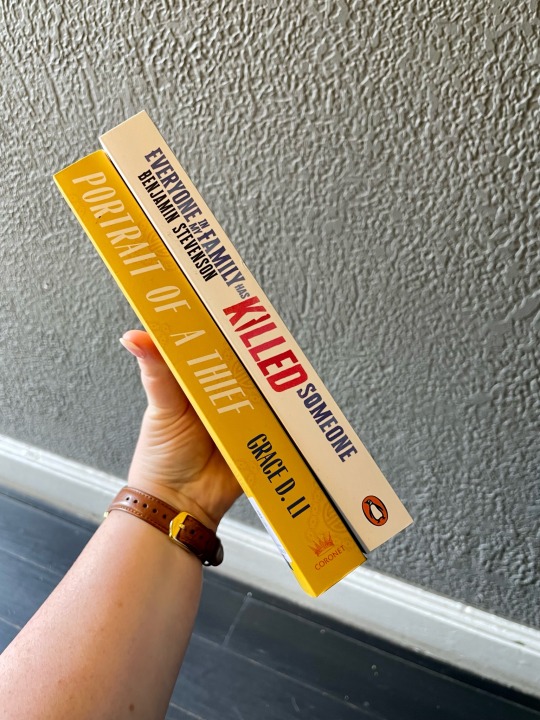
I used to work in a bookshop.
It was a new one, and I was hired before it opened. For weeks, I was surrounded by the smell of paint and sawdust as we got the place ready for opening. When its doors revealed it to everyone else for the first time, we gave a free book to the first customer and I remembered thinking, I can't wait until this place smells of paper instead of tireless renovation.
By the time I left, it did.
Most of my colleagues just wanted a “real job”: a nine-to-five and a salary with benefits, somewhere far from a new and characterless shopping centre in low-income area of our city. I couldn’t judge them for that; I wanted one, too. I wanted job security, and I wanted not to work until midnight on Christmas Eve, slinging David Williams and Roald Dahl and Jojo Moyes at disorganised fathers and husbands with stress veins pulsing at their temples.
And then I got a “real” job, and I realised working in a bookshop was the realest job I’d ever had.
Here are the things I remember:
The peace of the nature and travel section. We had an armchair there for the adventurers and gardeners who wanted a quiet moment in their day.
The mum who thanked me for choosing the right book, for helping her child to read something for the first time in years.
The little girl who talked my ear off for half an hour after school about the Murder Most Unladylike books.
Talking to authors, and hearing — seeing, too — their unspooling, magic passion about the worlds they’d created.
The growth of our accessible kids book section from one shelf to half a bookcase, though that hardly seemed enough. The joy of a little boy who had dyslexia and could finally read the book his friends were reading.
Saturday mornings in 2018. Slime was really popular and we had to shield our books with tarp, while the kids who made their own ran around with blue-purple-glitter-stained fingers.
The teenager who came in by herself every day with scuffed shoes and a heavy backpack. Each afternoon, she would read a chapter of a book with the utmost care. When she put it back on the shelf, there were no dog-ears. There were no coffee stains, no spinal damage, no sign she'd been there at all. We were that girl's local library. The day I realised that, I started taking the book she was reading off the shelf until the next day when school was out again.
Most of all, I remember the people. My friends with beautiful Celtic names who laughed with me as we shelved and shelved, and I remember Jack, a man with a booming laugh who'd always give me a lift home and who put kippers in the fucking microwave that made the break room stink for a week.
He played the bagpipes at my wedding.
I applied for another bookseller position today, half a world away in a place where literacy rates are high and the people buy the newest Barbara Kingsolver when it's in hardback and still priced over thirty dollars. If I get the job, I'm sure I'll love it. And I do want it. I want to return to saying the alphabet under my breath as I deal with a new delivery and fill the gaps in the shelves, exactly one book wide. I want to see streams of customers walking away with whole worlds in their hands, and in the off season when there isn't anything to do, I want to tuck my own book underneath the counter and read it surreptitiously.
But there's a grief about me too, today. I will never have my old life again. I will never again have that job I took for granted with those people I cherished.
I wish I loved it more when it was mine, but all I can do is make sure I love whatever comes next, too.
Anyway, here's to books.
17 notes
·
View notes
Text
Young colleague: Hi, me and Lacey need your help with something. This reserved book has a note on it and we don’t know what it means or what to do!
Me: okay, what is it?
Her: John reserved it and he’s written ‘KEEP CUSTOMER IN HOSPITAL.’ What do you think he means?
Me: do you think. he might mean: ‘Keep! Customer in hospital.’ As in, please extend the reservation for a week or two, until they can come and collect it
Her: oh!
Me: I don’t think he means for you to go round and break the customer’s legs or anything
Her: right, that makes sense
7 notes
·
View notes
Text
I’m sure you’ve heard about the new book buying policy at Barnes and Noble, and how marginalised authors are rightly concerned about how this will affect their future. Booksellers are worried too, and unfortunately we have every right to be - it was already difficult working within a large corporation dictating what we receive in store, but we could usually request titles we wanted to highlight, authors we wanted to champion, to share our passion and knowledge and make our shops as unique and diverse as we could, as much as corporate would allow. Already the new policy of only ordering ‘corporate curated titles’ is making our jobs impossible, and I feel sick about it.
Some examples of what’s been happening, with recent and upcoming books:
Daughter of the Moon Goddess, a Chinese mythological fantasy I personally handsold two dozen copies of in hardcover, before reorders stopped ‘because the paperback edition will be out soon’ (in four months) - currently on order: One.
Nona the Ninth, a book I don’t need to tell you is the next in a wildly popular, bestselling series that BN itself championed as a book of the month and is guaranteed to be another bestselling title - currently on order: One.
A Marvellous Light, a queer historical fantasy we originally received only one of, but was able to sell 13 more copies before they once again disallowed reorders - PBs currently on order: One. Upcoming HC sequel: None.
A Taste of Gold and Iron, a queer historical fantasy with massive online buzz I’ve been requesting for the shop for months and published yesterday - we received none at all
And these are for popular books, books that shouldn’t need booksellers to beg for more, to receive any copies of at all. I shouldn’t have had to wait for Iron Widow to win awards to be allowed to order their MG Zachary Ying and the Dragon Emperor for the shop. I shouldn’t have to tell our book buyer to do their damn job when a book already has an excellent sales history and we could sell more if they would just send it to us. I shouldn’t have to describe in minute detail, on every request for anyone who isn’t a white cishet author, why a book is worthy and will sell, as 30 copies of JK’s latest performative garbage that no one asked for (and will probably barely sell half of) arrives in store.
Trying to order books for debut authors, especially authors of colour, from smaller publishers, from anyone without incredible marketing and Booktok word of mouth behind it - and sometimes even when they do have them! - is like banging against an impenetrable wall, desperately hoping someone will let you in so you can share this book with the world. What makes this all the more upsetting is the new CEO’s supposed edict that ‘booksellers are the heart of our stores’, and we’re meant to use our expertise to select titles that create a unique experience for every shop, so it doesn’t feel like they’re all interchangeable anymore. This is the exact opposite of that, and I don’t know how they expect us to do it. I was a manager at Waterstones for a long time, both before and after James Daunt bought the company, and for the most part the changes he imparted upon taking over were (eventually) positive, so I foolishly believed he’d be doing the same when he bought B&N. I could not have been more wrong.
I’ve been a bookseller for almost 15 years, there are few things I love more than sharing bookish joy with others, and while there’s always been corporate obstacles to overcome and the publishing industry itself remains a problematic pain in the ass, I’ve rarely felt so overwhelmed by the futility of it all until now. I just feel so discouraged, defeated, utterly disheartened and frustrated beyond measure to be so unable to help uplift the voices and words that need it most :(
#publishing#books#bookselling#this is barely scratching the surface of how mindblowingly frustrating it is in store now#i'll get 10 copies of the latest manga in a series that's never even sold one copy#and 1 of the next in a bestselling series that sold 40#its inexplicable#the obvious way queer & poc authors are being shafted is infuriating#we're *trying* to get these books in our shops we promise#my recommends always sell but even that isn't enough to get orders anymore#i hate it here#when i should love it the most#adventures in bookselling
54 notes
·
View notes
Text
Happy Independent Bookstore Day!

Tomorrow (Apr 25) I’ll be in San Diego for the launch of my new novel, Red Team Blues, at 7PM at Mysterious Galaxy Books, hosted by Sarah Gailey. Please come and say hi!
_,.-'~'-.,__,.-'~'-.,__,.-'~'-.,__,.-'~'-.,__,.-'~'-.,_
It’s Independent Bookstore Day! I love bookstores, especially indies. I’m a recovering bookseller (love you, BakkaPhoenix!) and an inveterate and absurdly optimistic buyer of books — just this weekend, I bought three books at the LA Times Festival of Books, from Pages and Octavia’s Bookshelf!
If you’d like an essay-formatted version of this post to read or share, here’s a link to it on pluralistic.net, my surveillance-free, ad-free, tracker-free blog:
https://pluralistic.net/2023/04/24/tax-loss-harvesting/#ibd
Supporting indie bookstores doesn’t mean foregoing the convenience of buying online. Libro.fm pioneered a model that lets you nominate your favorite local bookstore, which receives part of the proceeds from every audiobook you buy at Libro (where all the audiobooks are DRM-free).
Libro is celebrating indie bookstores all week with stellar deals on an incredible lineup of audiobooks, from Octavia Butler’s Parable of the Sower to Chokepoint Capitalism, the book Rebecca Giblin and I wrote about how monopolies (including bookstore monopolies like Amazon) destroy the livelihoods of creative workers, and how to fight back:
https://libro.fm/ibd
You can also back your favorite indie bookstore when you shop online at Bookshop.org, who — like Libro — donate a portion of the cost of every book you buy to a nominated local bookseller:
https://bookshop.org/
Of course, nothing beats actually visiting your local bookstore, browsing the books, reading the shelf-reviews, and talking to knowledgeable, intelligent, passionate booksellers in person. I’m about to embark on a tour for my next novel, Red Team Blues, and I’ll be stopping at many great indie stores on the way.
Tomorrow, I’ll be in San Diego at Mysterious Galaxy Books for a launch with Sarah Gailey. On Wednesday, I’ll be in Burbank at Dark Delicacies. On May 5, I’ll be in Mountain View with Mitch Kapor at Books, Inc. There are plenty more stops, in PDX, Toronto, Vancouver, Calgary, DC, Gaithersburg, and all over the UK, finishing in Berlin:
https://pluralistic.net/2023/04/19/whats-wrong-with-iowa/#red-team-blues-tour
I hope to see you there! Also, my family has asked that you stage an intervention if you see me buying more books while I’m on tour!
_,.-'~'-.,__,.-'~'-.,__,.-'~'-.,__,.-'~'-.,__,.-'~'-.,_

Catch me on tour with Red Team Blues in San Diego, Burbank, Mountain View, Berkeley, San Francisco, Portland, Vancouver, Calgary, Toronto, DC, Gaithersburg, Oxford, Hay, Manchester, Nottingham, London, and Berlin!
_,.-'~'-.,__,.-'~'-.,__,.-'~'-.,__,.-'~'-.,__,.-'~'-.,_
[Image ID: A shot of the legendary El Ateneo bookstore, 'the world's most beautiful bookstore,' housed in a former grand theater in Buenos Aires, Argentina.]
_,.-'~'-.,__,.-'~'-.,__,.-'~'-.,__,.-'~'-.,__,.-'~'-.,_
Image:
Liam Quinn
https://www.flickr.com/photos/liamq/5459406835/
CC BY-SA 2.0
https://creativecommons.org/licenses/by-sa/2.0/
_,.-'~'-.,__,.-'~'-.,__,.-'~'-.,__,.-'~'-.,__,.-'~'-.,_
#pluralistic#audiobooks#libro.fm#bookstores#indie bookstores#bookselling#books#independent bookstore day
40 notes
·
View notes
Text
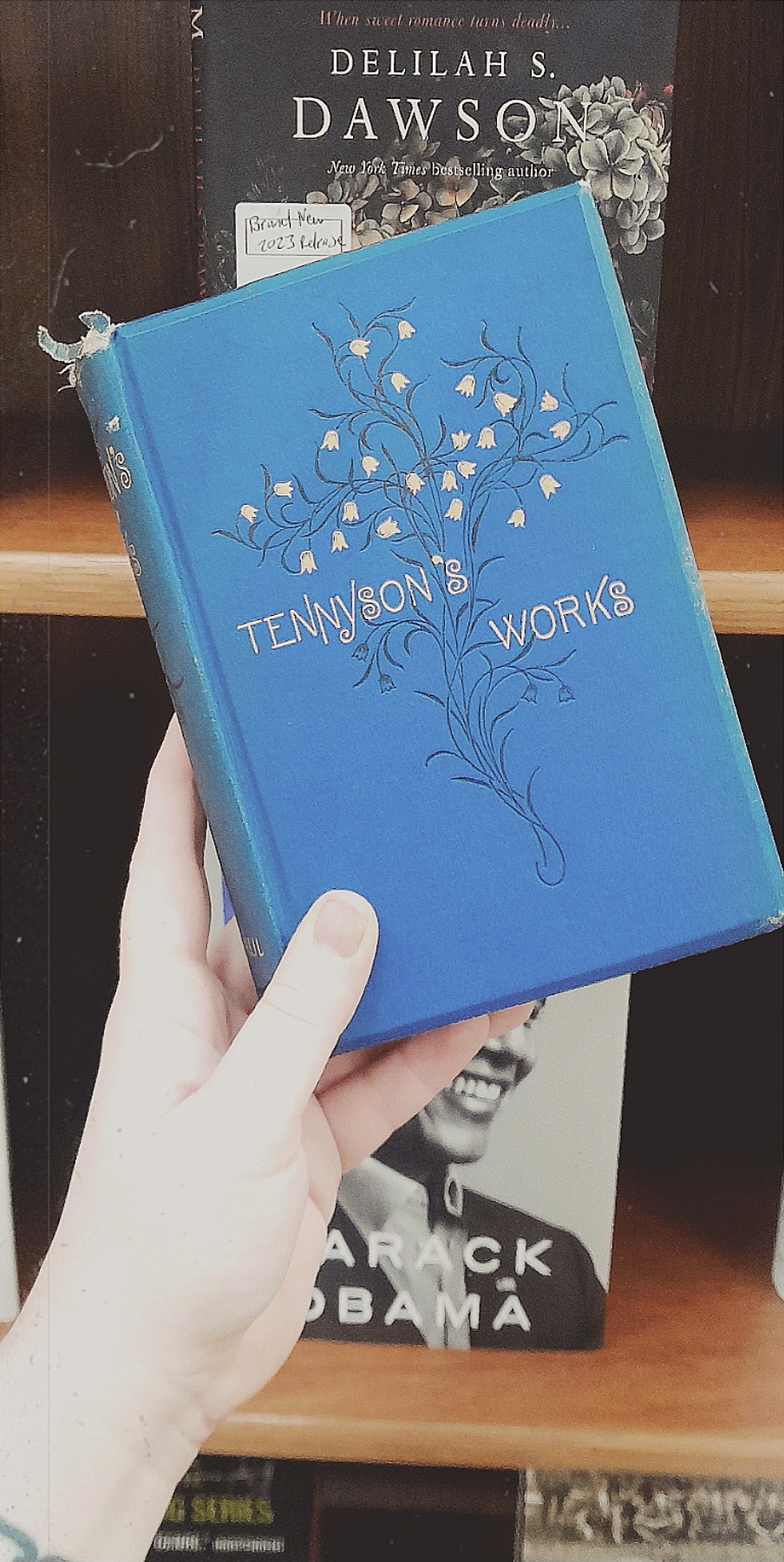
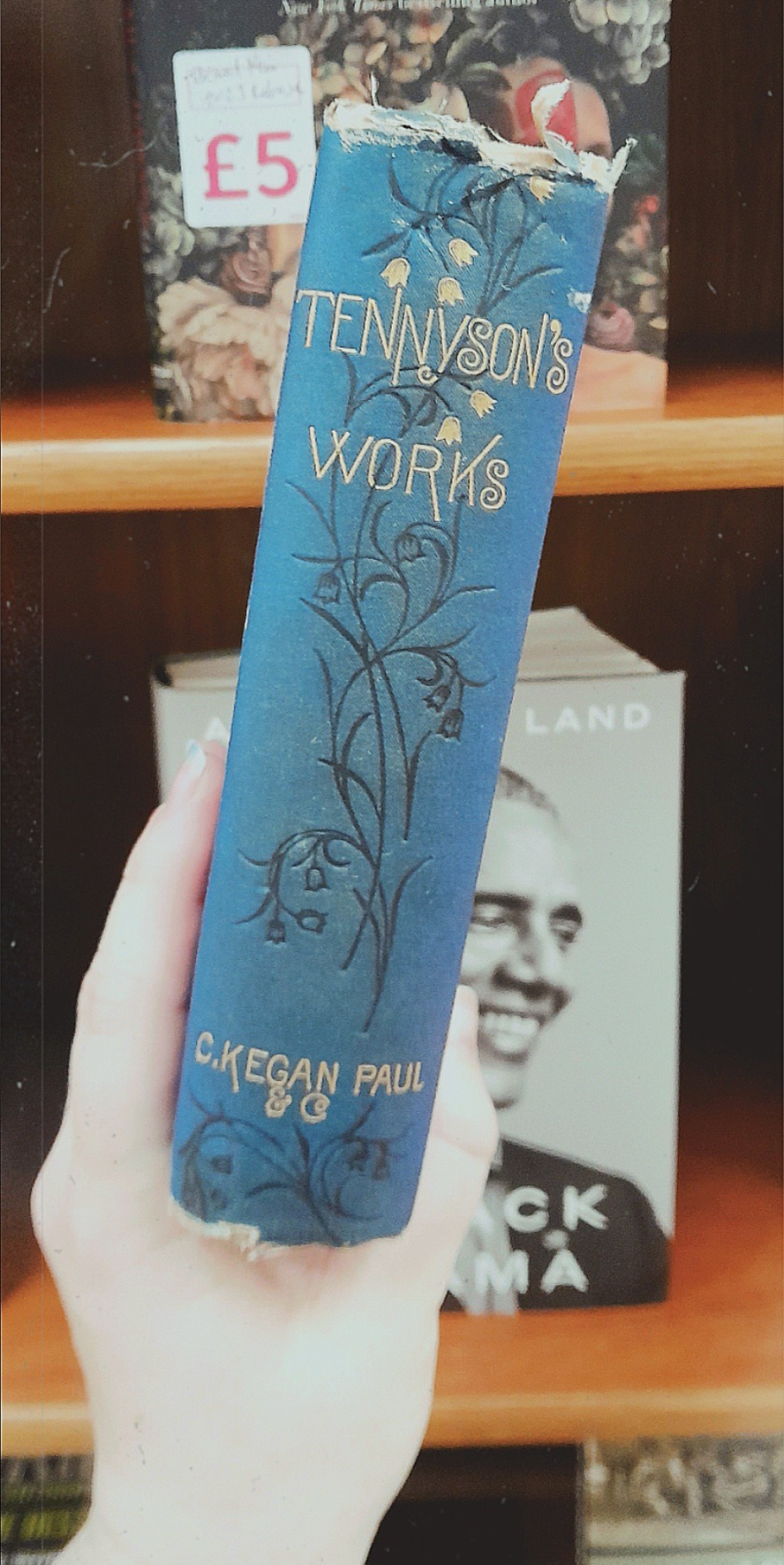

T e n n y s o n ' s W o r k s
1887 Edition
#old books#rare books#antiquarian books#book stuff#tennyson#blue books#pretty books#bookworm#bookseller#bookselling#book pages#book covers#poet#blue and gold#donated books#charity shop books#dark academia#book photo#booklr#bookblr#book cover#book community#book lover#book life#book pic#readers
80 notes
·
View notes
Text
Halloween Day Two

There was no way I wouldn't read about a cursed film from the 1960s, the Mexican film industry of the last century, Nazi occultists, and lifelong friends (a tough, horror loving sound engineer whose career has been derailed by systemic sexism, and a faded actor who doesn't need any help screwing up his) trying to help a failed director restore his legacy. But when that book is written by genre chameleon and bookseller favorite Silvia Moreno-Garcia it's not simply a delicious read, it was my book of the Summer for 2023.
From the jacket copy :
"
Montserrat has always been overlooked. She’s a talented sound editor, but she’s left out of the boys’ club running the film industry in ’90s Mexico City. And she’s all but invisible to her best friend, Tristán, a charming if faded soap opera star, though she’s been in love with him since childhood.
Then Tristán discovers his new neighbor is the cult horror director Abel Urueta, and the legendary auteur claims he can change their lives—even if his tale of a Nazi occultist imbuing magic into highly volatile silver nitrate stock sounds like sheer fantasy. The magic film was never finished, which is why, Urueta swears, his career vanished overnight. He is cursed.
Now the director wants Montserrat and Tristán to help him shoot the missing scene and lift the curse . . . but Montserrat soon notices a dark presence following her, and Tristán begins seeing the ghost of his ex-girlfriend.
As they work together to unravel the mystery of the film and the obscure occultist who once roamed their city, Montserrat and Tristán may find that sorcerers and magic are not only the stuff of movies."
If you are interested in being tagged this month or at any point I post reviews or recommendations please let me know.
@piggledy-higgledy @imdeadtiredtm @joyfullymassivewhispers @caffiend-queen @dangertoozmanykids101 @toozmanykids @myoxisbroken @wrathkitty @punemy-spotted @stupendouslovegardener @sylviefromneptune @dianamolloy
#bookselling#horror#31 days of halloween reading#31 days of halloween#silvia moreno garcia#silver nitrate#halloween 2023#halloween
4 notes
·
View notes
Text
Cozy Journaling

Been playing a lot of solo RPG/journaling games of late and I think my favorite so far, though probably the one which has required the most focus, has been Fox Curio's Floating Bookshop. I've made a nice, inquisitive Otter named Ollie and he has been traveling down the river and selling books. It's been light on conflict but been really fun. It's getting colder where I live and it seems the right time for 'light' and 'cozy' passtimes :3
3 notes
·
View notes
Text
New Book Alert!
Hi I' selling my book called Pulse of Love: A Healing Heart's Journey for only $3, I promise to you that this is so worth it to buy!

https://koji.to/k/95ec
2 notes
·
View notes